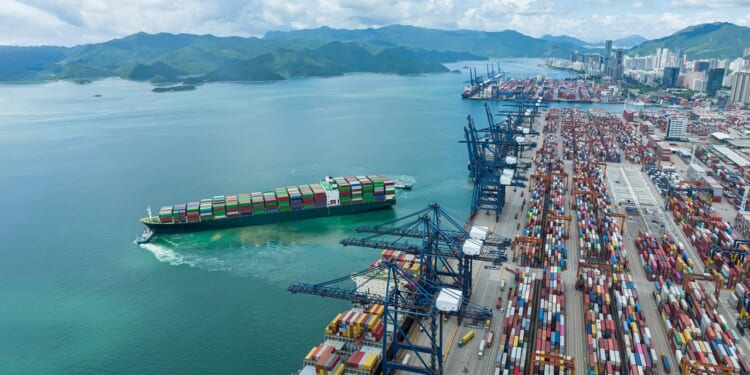A National Guard captain has warned that damage to China’s ports during a US-China war could be long and arduous to repair—with long-term impacts to the US economy as well.
After the American Revolution, the newly formed United States of America retained close ties with Great Britain. Instead of going their separate ways, the two countries maintained a very strong trade relationship, with the UK dominating US trade for years. Britain remained Washington’s leading trading partner throughout the 19th century.
It wasn’t the last time a former enemy of the United States would quickly become a trading partner. Just over a decade after World War II, the United States had resumed large-scale trade with West Germany and Japan.
Future trade could be a primary reason that the United States should not commit to destroying Chinese ports in the event of an unthinkable war. That is the argument of Capt. Micah Neidorfler, US Army National Guard, in a newly published paper in Military Review, the professional journal of the US Army. In “Fighting for the Day After: Preserving Chinese Maritime Infrastructure in a Conventional War,” Neidorfler explained that American “prosperity and national interests are directly linked to China,” and that the economies of the two nations are “deeply and irrevocably linked through international trade.”
Even as the United States seems on a course to war with China, one that most military and geopolitical experts hope can be avoided, Washington and Beijing must still think about the aftermath.
“The US Army, in planning for a possible US-China war, needs to address winning on the battlefield, but also securing a viable postwar settlement, something the Army has struggled with since the Second World War,” the author added.
Can You Win a War Without Destroying the Enemy?
Throughout modern military history, the doctrine of war has almost invariably been about destroying an adversary’s ability to fight. This approach has been more successful in most cases than breaking the enemy’s will to fight.
In World War II, Nazi Germany never lost that will, as its leaders opted for near total destruction of the Fatherland. The same was arguably true with Japan—at least until the atomic bomb changed the mind of Emperor Hirohito. Before the atomic bombs were dropped on Hiroshima and Nagasaki, Japan still clung to the hope of a negotiated peace with conditions, and Tokyo wasn’t anywhere close to accepting an unconditional surrender.
Barring a nuclear confrontation, a war between two great powers in the 21st century may never reach such a conclusion. Neidorfler takes the view that the United States can’t win a war that would result in China’s unconditional surrender, and therefore, destroying its shipping facilities would go against American interests once peace is restored.
“The [US] Army should preserve Chinese maritime shipping infrastructure during conflict so that it is usable postwar. This would best serve US long-term economic interests and help set conditions for a sustainable peace between the United States and China,” Neidorfler suggested.
The goal in war may be to destroy an enemy, including either its will to fight or its ability to fight. With China, the answer may be that neither goal is even remotely achievable. Victory needs to occur in some other way, which could include the destruction of China’s fleet in a showdown in the Pacific. Of course, the Imperial Japanese Navy believed it could achieve victory over the United States in such a manner, and we only need to remember it resulted in the aforementioned atomic bombs being dropped on two of its cities.
Would a Long-Term US-China War Favor China?
There are many reasons to believe that China can fight a prolonged war. It has a massive economy, with an equally massive industrial base, capable of sustaining production and logistics. The United States’ vast population and industrial capacity proved the undoing for the Axis Powers during World War II; today, the United States finds itself on the opposite end of the equation. China has, at least for now, a large population that can endure hardship and casualties for a long time—and Beijing’s ability to “eat bitterness” is likely greater than that of the United States.
China’s authoritarian system may also allow it to better mobilize resources and maintain control without fear of public pressure against a prolonged war.
Of course, Beijing has several significant disadvantages if it goes to war with the United States. It hasn’t fought anything resembling a war since a brief border conflict with Vietnam in 1979. It has no fighter pilots who have been in real combat, and no warships that have ever fired their guns in anger. It has never deployed its aircraft carriers in combat operations.
The closest to fighting that the People’s Liberation Army (PLA) has taken part in over the last quarter-century has been minor skirmishes against Indian troops in the Himalayas—primarily conducted with rocks and clubs, as firearms are banned along the border in order to prevent escalation into open war.
China also has a low birth rate and an aging population. Losing thousands, perhaps tens or even hundreds of thousands of men, isn’t going to fix that problem.
Yet the pros and cons still suggest that anything other than a short war will be devastating for China—and equally devastating for the United States.
The US and China Face Mutually Assured Economic Destruction
During the Cold War, the United States and the Soviet Union never went to war due to the threat of mutually assured destruction from nuclear weapons. The same is true today. Even setting aside the nukes, however, there is the likelihood of mutual economic destruction. A case could be made that, given the cost of today’s military hardware, any war could also result in mutually assured bankruptcy!
Still, a major war would damage China’s integration into the global supply chain, while the US is too dependent on Chinese goods. A conflict would destabilize the global economy to the point that it could take decades to recover.
Should a war break out, and the United States not be entirely defeated, China’s ability to resume trade needs to be considered, wrote Neidorfler.
Even if the United States can’t “expect a friendly Chinese government postwar,” preserving China’s ports would be a “path toward better relations.”
The question, then, is: how can the United States expect to win a war without such destruction?
Instead of destroying China’s ports, the United States may want to consider blockading them—possibly by sinking a vessel or two, which could be cleared more easily once peace is restored—and gaining control of China’s shipping lanes. Another option would be for the US military to seize Chinese global maritime infrastructure, which “denies China’s use of these assets during a conflict,” while it “allows the United States to leverage these seized assets during negotiations.” Finally, “it protects this infrastructure for postwar use, as ports are particularly vulnerable to damage in the chaotic landscape of great-power conflicts.”
Wouldn’t Avoiding a US-China War Be Better Still?
With respect to Neidorfler’s case study, the US cannot plan for the day after, as that makes an assumption that it can win and that China wouldn’t opt to destroy America’s ports. Another consideration is that Germany was truly destroyed, yet it underwent rapid reconstruction and economic growth during the period known as the Wirtschaftswunder, or the “West German miracle.” Japan, too, saw massive economic growth in the aftermath of World War II, even as its cities lay in ruins.
Both countries became strong democracies. If a “friendly Chinese government” isn’t part of the equation, it could just reset the board for an even more devastating war down the line.
The better course of action is to avoid a significant conflict in the first place. Most military planners already acknowledge that “no plan survives contact with the enemy.” Therefore, it seems to question how the US Army or the entire US military can go into a war with China, while acknowledging that its ports need to remain intact. If a war goes badly for the United States in the early stages, as happened in World War II against Japan, it is impossible to imagine that any serious consideration would be given to trade deals in the post-war world.
Likewise, if China sees that it will lose a war, it may not be concerned with its ports if its regime may not survive. The road to victory therefore needs to consider the options to get there.
About the Author: Peter Suciu
Peter Suciu has contributed over 3,200 published pieces to more than four dozen magazines and websites over a 30-year career in journalism. He regularly writes about military hardware, firearms history, cybersecurity, politics, and international affairs. Peter is also a contributing writer for Forbes and Clearance Jobs. He is based in Michigan. You can follow him on Twitter: @PeterSuciu. You can email the author: [email protected].
Image: Shutterstock / asharkyu.


















